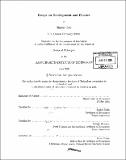Essays on development and finance
Author(s)
Cole, Shawn (Shawn Allen)
DownloadFull printable version (8.303Mb)
Other Contributors
Massachusetts Institute of Technology. Dept. of Economics.
Advisor
Esther Duflo and Abhijit Banerjee.
Terms of use
Metadata
Show full item recordAbstract
This thesis is a collection of three empirical essays on economic development and finance. Chapter 1 examines how politicians influence the lending decisions of government owned- banks, particularly whether government resources are used to achieve electoral goals. Theories of electoral competition predict how politicians may allocate resources to win elections: distributing more resources prior to election years, and targeting these resources towards "close" races. I find strong evidence of manipulation in agricultural lending by government banks. More credit is lent just prior to election years. Moreover, this spike is most pronounced in districts in which the previous election was close. I document that these distortions are costly: repayment rates vary with the electoral cycle, while output does not. Chapter 2 tests theories of public and private ownership of banks. In 1980, the government of India nationalized some private banks while leaving similar banks in private hands. Using a regression discontinuity design, I find that government owned banks grew less quickly and lent more to agriculture. These differences manifest themselves in outcomes across credit markets in India as well. Villages whose banks were nationalized received a substantial increase in agricultural and total credit, at lower interest rates, than villages whose banks were not. Strikingly, the additional credit had no effect on real agricultural outcomes, and may have hurt employment in trade and services. Chapter 3 investigates the economics of manumission, a process whereby a slave purchases her own freedom. Using newly collected data from Louisiana, I first paint a qualitative and quantitative portrait of manumission. (cont.) I then answer the question of whether slaves purchasing their freedom paid above market prices. Legal changes following the Louisiana Purchase allow me to conclude that manumission laws were quite important in determining the terms at which manumission agreements were struck: when slaves lost the right to sue for self-purchase at market price, there was a precipitous drop in the number of manumissions, while prices paid increased.
Description
Thesis (Ph. D.)--Massachusetts Institute of Technology, Dept. of Economics, 2005. "June 2005." Includes bibliographical references.
Date issued
2005Department
Massachusetts Institute of Technology. Department of EconomicsPublisher
Massachusetts Institute of Technology
Keywords
Economics.